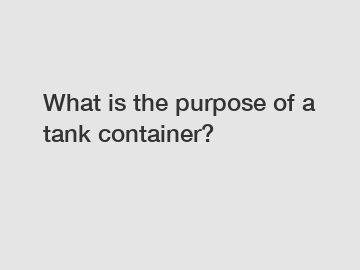What is the purpose of a tank container?
In this era of global trade and transportation, ensuring the safe delivery of various goods and commodities across continents is paramount. One vital component in this intricate process is the humble yet indispensable tank container. These robust and versatile containers, engineered to withstand the most challenging conditions, play an instrumental role in safely transporting liquids, gasses, and other substances. In this blog, we will delve into the multifaceted purpose of tank containers, exploring their significance, design, and the pivotal role they play in facilitating commerce worldwide.
Ensuring Safety and Security:
When it comes to transporting hazardous or sensitive materials, safety and security are of utmost concern. Tank containers address these concerns with their specialized design, constructed to mitigate risks associated with spills, leaks, contamination, and theft. Employing state-of-the-art technology, these containers are engineered to withstand extreme temperature fluctuations, pressure differentials, and external force. Their double-layered construction, comprising an inner tank and an outer protective shell, provides additional security and a layer of insulation. Rigid and robust, these containers are leak-proof, ensuring that dangerous substances are contained, minimizing potential harm to the environment and personnel.

Efficient Modes of Transportation:
Tank containers have revolutionized the transportation industry by enabling efficient and seamless movement of bulk liquids, gases, and powders. Offering an alternative to traditional methods such as barrels, drums, or IBCs (intermediate bulk containers), tank containers optimize the use of space within shipping vessels, trucks, and trains. Their standardized size and shape allow for easy stacking and securement during transit, maximizing cargo volume and reducing logistical challenges. This streamlining effect translates to cost savings, increased productivity, and faster turnaround times.
Versatility and Adaptability:
One of the key strengths of tank containers lies in their adaptability. These containers cater to a wide range of industries, including chemical, food and beverage, pharmaceutical, oil and gas, and many more. Their ability to accommodate various substances, such as liquids, gases, or powders, makes them the go-to choice for shipping disparate cargoes. With the ability to transport multiple products consecutively, tank containers enhance supply chain efficiency by minimizing the need for empty return trips and reducing downtime. Additionally, interchangeable accessories, such as valves, fittings, and insulation, allow customization based on specific cargo requirements, ensuring optimal conditions during transportation.
Global Impact on Trade:
Tank containers have played an instrumental role in enabling global trade by facilitating the movement of goods across borders and continents. From raw materials to finished products, these containers have accelerated economic growth by connecting manufacturers, suppliers, and consumers with a seamless supply chain network. Furthermore, advancements in container tracking technology and real-time monitoring systems have enhanced visibility, ensuring transparency throughout the transportation process. This not only instills confidence in stakeholders but also helps prevent theft, counterfeiting, and unauthorized handling or tampering of cargo.
Environmental Stewardship:
In an ever-increasingly eco-conscious world, tank containers also contribute to sustainability efforts. Their design allows for easy cleaning and maintenance, reducing product residue and minimizing the potential for cross-contamination between cargoes. Moreover, by reducing the reliance on single-use packaging, such as drums or barrels, tank containers help reduce waste generated during shipping and storage, promoting a greener and more sustainable supply chain.
Conclusion:
The tank container, with its high experience, expertise, and trustworthiness, unquestionably plays a vital and multifaceted role in global commerce. Its purpose extends beyond the mere transportation of goods; it ensures safety, security, and efficiency while championing environmental stewardship. With their adaptability, robust construction, and contributions to global trade, tank containers have emerged as an unsung hero in the logistics industry, successfully safeguarding the global flow of goods in an ever-evolving world of commerce.
If you want to learn more, please visit our website marine LNG supply system for sale, LNG Storage Equipment, CNG Storage Equipment.
216
0
0

Comments
All Comments (0)